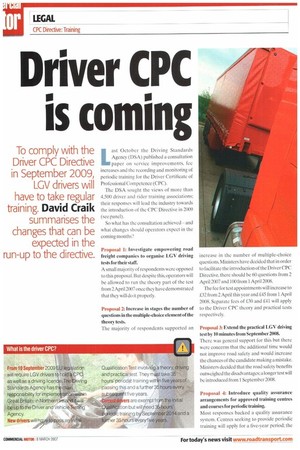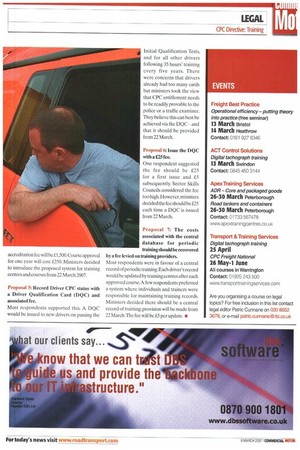Driver CPC is coming
Page 32

Page 33

If you've noticed an error in this article please click here to report it so we can fix it.
To comply with the Driver CPC Directive in September 2009, LGV drivers will have to take regular
training. David Craik
summarises the changes that can be expected in the run-up to the directive.
Last October the Driving Standards Agency (DSA) published a consultation paper on service improvements, fee increases and the recording and monitoring of periodic training for the Driver Certificate of Professional Competence (CPC).
The DSA sought the views of more than 4,500 driver and rider training associations; their responses will lead the industry towards the introduction of the CPC Directive in 2009 (see panel).
So what has the consultation achieved — and what changes should operators expect in the coming months?
Proposal 1: Investigate empowering road freight companies to organise LGV driving tests for their staff.
A small majority of respondents were opposed to this proposal. Rut despite this, operators will be allowed to run the theory part of the test from 2 April 2()07 once they have demonstrated that they will do it properly.
Proposal 2: Increase in stages the number of questions in the multiple-choice element of the theory tests.
The majority of respondents supported an increase in the number of multiple-choice questions. Ministers have decided that in order to facilitate the introduction of the Driver CPC Directive, there should be 60 questions from 2 April 2007 and 100 from 1 April 2008.
The fee for test appointments will increase to f...12 from 2 April this year and £45 from 1 April 2008. Separate fees of £30 and £41 will apply to the Driver CPC theory and practical tests respectively.
Proposal 3: Extend the practical LGV driving test by 10 minutes from September 2008. There was general support for this but there were concerns that the additional time would not improve road safety and would increase the chances of the candidate making a mistake. Ministers decided that the road safety benefits outweighed the disadvantages; a longer test will be introduced from 1 September 2008.
Proposal 4: Introduce quality assurance arrangements for approved training centres and courses for periodic training.
Most responses backed a quality assurance system. Centres seeking to provide periodic training will apply for a five-year period; the accreditation fee will be £1,500. Course approval for one year will cost £250. Ministers decided to introduce the proposed system for training centres and courses from 22 March 2007.
Proposal 5: Record Driver CPC status with a Driver Qualification Card (DQC) and associated fee.
Most respondents supported this. A DQC would be issued to new drivers on passing the Initial Qualification Tests. and for all other drivers following 35 hours' training every five years. There were concerns that drivers already had too many cards hut ministers took the view that CPC entitlement needs to be readily provable to the police or a traffic examiner. They believe this can best he achieved via the DQC and that it should be provided from 22 March.
Proposal 6: Issue the DQC with a US fee.
One respondent suggested the fee should be £25 for a first issue and £5 subsequently. Sector Skills Councils considered the fee too high. However,ministers decided the fee should be £25 each time a DQC is issued from 22 March.
Proposal 7: The costs associated with the central database for periodic training should be recovered by a fee levied on training providers.
Most respondents were in favour of a central record of periodic training. Each driver's record would be updated by training centres after each approved course. A few respondents preferred a system where individuals and trainers were responsible for maintaining training records. Ministers decided there should be a central record of training; provision will be made from 22 March.The fee will be f.:5 per update. •






















































































































































































